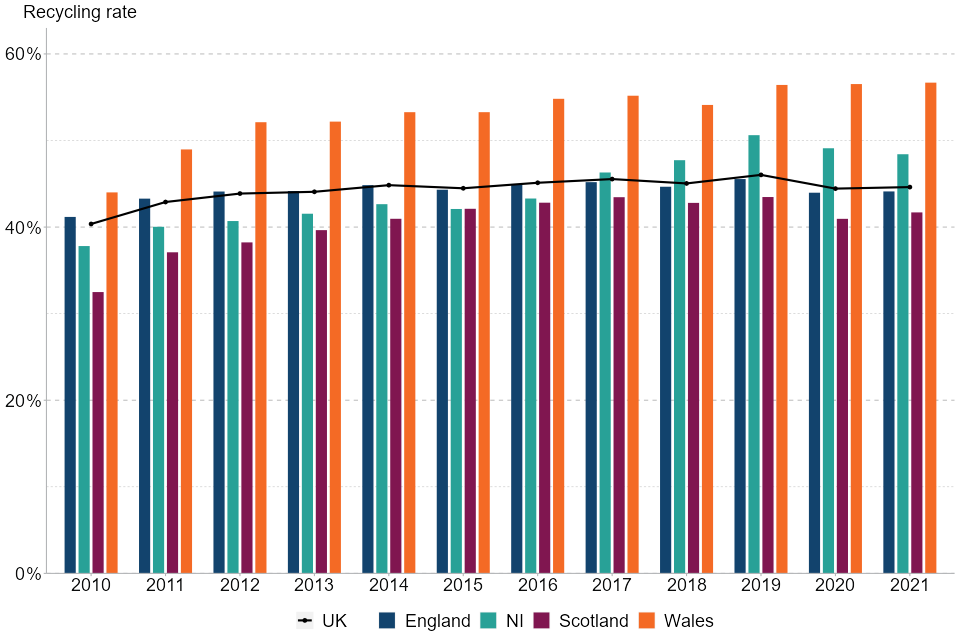Recycling: Difference between revisions
Addition of text |
m minor text change |
||
| Line 1: | Line 1: | ||
[[Category:Technologies & Solutions]] [[Category:Legislation & Policy]] | [[Category:Technologies & Solutions]] [[Category:Legislation & Policy]] | ||
[[Recycling]] is defined as ‘any recovery operation by which waste materials are reprocessed into products, materials or substances whether for the original or other purposes'. It includes the reprocessing of organic material (e.g. [[Composting]], [[Anaerobic Digestion]] etc.) but excludes energy recovery and the reprocessing into materials that are to be used as fuels or for [[Backfilling]] operations.’ <ref>[https://eur-lex.europa.eu/legal-content/EN/TXT/PDF/?uri=CELEX:32008L0098&from=EN] Waste Framework Directive 2008 </ref> <ref>[https://www.gov.uk/government/statistics/uk-waste-data UK Statistics on Waste 2019] updating some of the 2018 Digest with 2017 data </ref>. | [[Recycling]] is defined as ‘any [[recovery]] operation by which waste materials are reprocessed into products, materials or substances whether for the original or other purposes'. It includes the reprocessing of organic material (e.g. [[Composting]], [[Anaerobic Digestion]] etc.) but excludes energy recovery and the reprocessing into materials that are to be used as fuels or for [[Backfilling]] operations.’ <ref>[https://eur-lex.europa.eu/legal-content/EN/TXT/PDF/?uri=CELEX:32008L0098&from=EN] Waste Framework Directive 2008 </ref> <ref>[https://www.gov.uk/government/statistics/uk-waste-data UK Statistics on Waste 2019] updating some of the 2018 Digest with 2017 data </ref>. | ||
==Collection== | ==Collection== | ||
Revision as of 08:08, 23 June 2021
Recycling is defined as ‘any recovery operation by which waste materials are reprocessed into products, materials or substances whether for the original or other purposes'. It includes the reprocessing of organic material (e.g. Composting, Anaerobic Digestion etc.) but excludes energy recovery and the reprocessing into materials that are to be used as fuels or for Backfilling operations.’ [1] [2].
Collection
Collection systems for materials that can be recycled varies by location across the UK, a range of factors influence the collection scheme that is employed for a region including whether the area is rural or urban and the type of housing and facilities in the area. There are three broad collection schemes in the UK:
Process
Following collection and sorting, recyclable materials are sent for reprocessing. This generally occurs at a Material Recovery Facility (MRF). Mixed recycling streams are sorted into different material types at MRFs, either mechanically or by hand, ready for the materials to then be sent to manufacturers to make it into new products. Once recyclable materials are sorted, they are then classified as valuable commodities in the worldwide markets[3].
Performance for Household Waste
The UK waste from households recycling rate (including IBA metal) was 45.7% in 2017, increasing from 45.2% in 2016. The UK target is for 50% by 2020.

References
- ↑ [1] Waste Framework Directive 2008
- ↑ UK Statistics on Waste 2019 updating some of the 2018 Digest with 2017 data
- ↑ 3.0 3.1 Recycle Now, 2020. Recycling collections | Recycle Now. Online. Recyclenow.com. [Accessed 3 Mar. 2020.]
